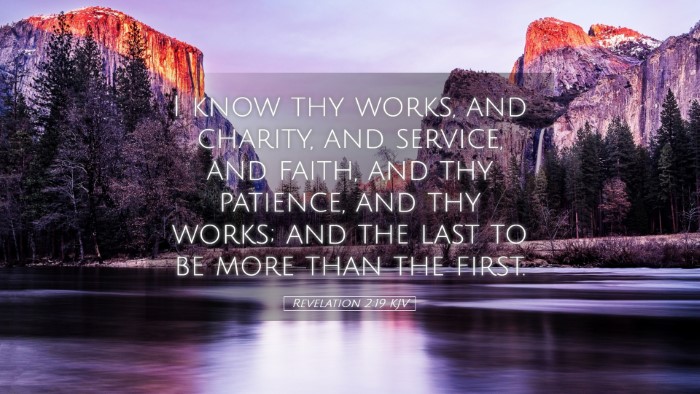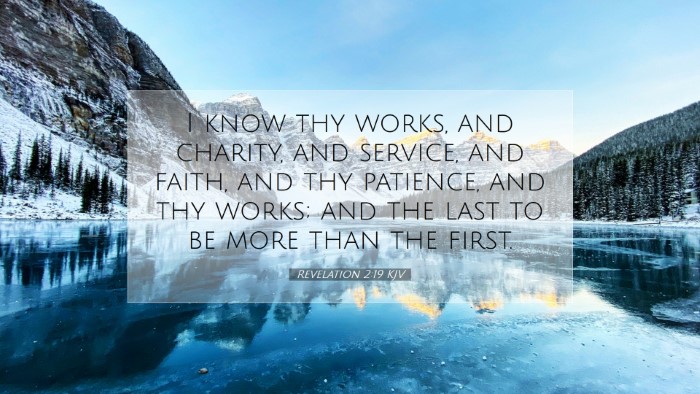Commentary on Revelation 2:19
Verse: "I know your works, and love, and service, and faith, and your patience, and your works; and the last to be more than the first."
Introduction
This verse is a part of the message to the church in Thyatira, as revealed to John in the Book of Revelation. The commendation here reflects the church's activities and qualities which are crucial for both individual and collective Christian life.
Analysis of the Verse
In Revelation 2:19, we find a combination of elements that constitute the church's identity and faithfulness. This commentary synthesizes insights from various public domain sources to illuminate the meaning and implications of this verse.
1. The Divine Knowledge of Works
Matthew Henry emphasizes that Christ, who walks among the churches, has a thorough knowledge of their works. He notes the significance of Christ's acknowledgment of their deeds which affirms the importance of actions in the Christian faith. Good works are manifestations of the faith that resides within believers.
2. The Components of Christian Service
- Love: The love mentioned here can be interpreted as both love for God and love for one another. Albert Barnes makes it clear that this love is foundational in the life of a believer, echoing Jesus' command to love one another.
- Service: This refers to the active engagement within the church and the community. Adam Clarke emphasizes that genuine service arises out of love and faith, pointing towards a practical outworking of one’s faith.
- Faith: The faith exercised by this church indicates a reliance on God’s promises and a deep loyalty to the truth of the Gospel. Clarke notes the essentiality of faith as the backbone of all spiritual activity.
- Patience: Patience in tribulation is a hallmark of the Christian faith, according to Henry. It signifies endurance amidst trials and tests, reflecting a heart that trusts in God’s providence.
3. The Nature of Works
The phrase "and your works; and the last to be more than the first" suggests a progressive increase in their deeds. Henry notes that spiritual growth is characterized by more abundant good works over time—a theme prevalent in the growth of Christian grace.
Barnes elaborates that the mention of 'the last to be more than the first' indicates both quality and quantity of service; it underscores the expectation of believers to grow in their faith and service as they mature spiritually.
Theological Implications
Spiritual Accountability: The fact that Christ knows the works of the church suggests that there is an element of accountability among believers. It reinforces the necessity of living a life that reflects Christ's teachings.
The Role of the Church: The church’s collective actions are highlighted, suggesting that while individuals contribute to the body of Christ, the collective witness is equally significant. Commentary from Clarke points to the community aspect of faith and service.
Progressive Revelation: The idea of increased works over time encourages believers to strive for continual growth in their spiritual journey. Barnes suggests that this progression reflects divine empowerment for those committed to Christ.
Practical Applications
The lessons from Revelation 2:19 can be directly applied to the life of contemporary believers and the church as a whole. Here are some practical applications:
- Self-Examination: Pastors and church leaders should encourage congregants to regularly assess their love, service, and commitment to faith.
- Encouragement in Service: Community engagement and service projects can be avenues through which churches can express their love for God and one another.
- Mentorship and Growth: Leadership should involve nurturing believers to grow in patience and faith through Bible studies and discipleship programs.
Conclusion
Revelation 2:19 serves as a compelling reminder of the virtues that ought to characterize the church. The commendation of works, love, service, faith, and patience draws attention to the holistic nature of Christian living. As we reflect on this verse, we are prompted to contribute to a larger narrative of faithfulness, bearing witness to Christ’s transformative power in our lives. Through diligent work, ongoing love, steadfast faith, and patience in challenges, believers can honor the call of Christ in today’s world.


